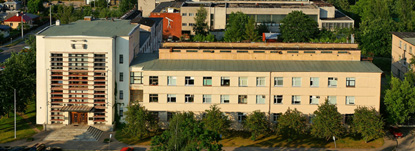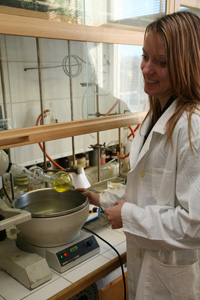About LIOS
Latvian Institute of Organic Synthesis (LIOS) is a research center located in Riga, Latvia operating under Ministry of Science and Education. Although the institute is an independent research organization it works in very close collaboration with two major local universities to support the student education both at undergraduate and graduate level. The origin of the present status and research directions dates back to some 50 years ago. LIOS was established in 1957 as a member of group of institutes under Academy of Sciences in former USSR. It was created as a soviet counterpart to western pharmaceutical companies with the aim to undertake all the stages of drug development from idea to manufacturing. Such concept required close cooperation of academic and applied research which was not typical for that time. The efficiency of the idea was proven by 17 original drugs and more than 70 original preparation methods of known drugs which were discovered and introduced to the market during soviet times. The turning point in the institute’s life coincided with the collapse of USSR and regaining Latvia’s independence in 1991. While the institute remained as public research organization, it managed to survive through difficult 90-ties with very low national funding. It was possible mainly due to previously accumulated experience in drug discovery that formed a firm base for contract research programs with foreign and domestic pharmaceutical companies. During the past decade national as well as EU funding increased notably, which allowed to modernize the equipment that is crucial for performing advanced research (400 MHz, 600 MHz NMR spectrometers, a host of chromatographic instruments both for preparative and analytical applications). Besides academic research programs LIOS has remained active in contract research. More than 270 patents have been filed in the last 5 years together with business partners from different countries. In cooperation with UK and Danish companies a new anti cancer drug (currently in 2nd phase clinical trials) has been developed. Scientists from LIOS were involved both in design of the active entity and synthetic development of the molecule which now undergoes 2nd phase clinical trials for CNS associated diseases. On January 2009 Latvian Institute of Organic Synthesis was awarded with WIPO Award for Innovative Enterprises.

Currently, LIOS is a working place for 300 employees, 110 of them hold PhD degree. It is structured in 17 groups that closely collaborate in different projects. LIOS possesses 2424 m2 of fully equipped laboratory space for organic synthesis and analytical chemistry.
Apart from research activities, LIOS publishes Journal of Heterocyclic Compounds which is issued in English version by Springer. Institute also organizes biannual Paul Walden Symposium in Organic Chemistry that was held for the 6th time this year. The success of the symposium is ensured by high level scientific presentations and discussions contributed by outstanding speakers from academic and industrial institutions from around the world.
The following are the main areas of LIOS activities:
Medicinal chemistry
Medicinal chemistry projects at the IOS are not only revolved around preparation of large number of compounds, they cover all stages of preclinical development, starting with the concept and often ending with the clinical candidate. The major strength of the medicinal chemistry carried at LIOS certainly is organic synthesis. The areas of expertise include sophisticated synthesis of complex target compounds to discover patent free scaffolds as well as parallel synthesis for rapid generation of analogue series. New trends in organic chemistry are rapidly acquired and advanced methodology is used for drug discovery projects. In vitro and in vivo test systems established by LIOS pharmacologists support rapid lead development avoiding logistics and bureaucracy problems often associated with sample transfer from one research center to another. The typical medicinal chemistry projects at LIOS include: 1) protein structure determination and investigation of protein-ligand interaction by NMR spectroscopy, 2) design and synthesis of novel patentable compounds with diverse therapeutic potential, 3) design and synthesis of compound series for lead discovery, 4) design and synthesis of compounds necessary for other purposes in drug discovery projects e.g. metabolites, standard reagents etc., 5) in silico screening of virtual libraries and generation of new core structures.
Besides these «classical» medicinal chemistry activities, significant efforts are invested in interdisciplinary research towards new medicines. There are ongoing projects at the IOS devoted to discovery of new gene transfection agents, artificial liposomes etc.
Pharmacology and biological studies
 The biological activity testing subunits in LIOS have highly skilled research staff and up-to-date equipment to perform both independent pharmacological studies and to assist medicinal chemists with activity screening tests. Pharmacological experiments are followed by in-depth analysis of the obtained tissue samples in collaboration with analytical units of LIOS. The typical biological activity testing at LIOS include: 1) screening of compounds in the test systems and development of screening systems for new indications, 2) investigations of the mechanisms of action of active ingredients, 3) biochemical measurements, radioligand binding studies, molecular biology assays, immunohistochemisty, 4) in vitro experiments in cell culture and isolated organs, 5) cardiovascular pharmacology in small experimental laboratory animals, 6) in vivo CNS activity testing, 7) anticancer activity screening in vitro and in vivo, 8) drug metabolism and pharmacokinetics, 9) toxicology tests.
The biological activity testing subunits in LIOS have highly skilled research staff and up-to-date equipment to perform both independent pharmacological studies and to assist medicinal chemists with activity screening tests. Pharmacological experiments are followed by in-depth analysis of the obtained tissue samples in collaboration with analytical units of LIOS. The typical biological activity testing at LIOS include: 1) screening of compounds in the test systems and development of screening systems for new indications, 2) investigations of the mechanisms of action of active ingredients, 3) biochemical measurements, radioligand binding studies, molecular biology assays, immunohistochemisty, 4) in vitro experiments in cell culture and isolated organs, 5) cardiovascular pharmacology in small experimental laboratory animals, 6) in vivo CNS activity testing, 7) anticancer activity screening in vitro and in vivo, 8) drug metabolism and pharmacokinetics, 9) toxicology tests.
Organic synthesis method development
Development of original preparation methods of already known active molecules has been one of the main research directions of the institute since the very beginning. The process chemists of the IOS develop general synthetic methods applicable to a number of compounds which are of interest for pharmaceutical research and development. 1) Development of convenient synthetic procedures for preparation of potential lead compounds or candidate drugs, 2) development of original (patent free) preparation methods of known active pharmaceutical ingredients, 3) consulting of pharmaceutical manufacturers during scale-up of the developed procedures, 4) development of preparation methods and synthesis of building blocks required by medicinal chemists, 5) optimization of synthetic procedures for large-scale synthesis, 6) identification of critical steps for large-scale synthesis, setting of preliminary quality specifications for starting materials involved.
Process chemistry activities are usually accompanied by fundamental research projects aimed to develop new methods in organic chemistry. The projects are typically realized by involving graduate students who work on their degree dissertations associated with the project. Thus, new method development activities at the LIOS represent the best example of fundamental research contribution to the needs of applied research.
Analytical chemistry
Analytical chemistry is an important tool for process and medicinal chemistry as well as for pharmacological studies. LIOS has a team of highly skilled analytical chemistry experts capable to perform challenging tasks and to assist organic chemists and pharmacologists in their research. The tasks of analytical chemistry section at LIOS imply structure elucidation of newly synthesized molecules, development of in-process monitoring tools, characterization of compounds, continuous support of pharmacologists. Moreover, during the last years, the GMP certified analytical test facility was established to perform stability studies of active pharmaceutical ingredients and final dosage forms. Both classical wet chemistry procedures and modern analytical techniques are applied to solve tasks of various complexity. The typical analytical chemistry at IOS include: 1) structure determination of organic molecules both by NMR and X-ray methods, 2) impurity profiling of synthesized compounds, 3) development and validation of analytical procedures both for in process and quality control purposes, 4) ICH compliant stability testing of active pharmaceutical ingredients and final dosage forms characterization of organic compounds including active pharmaceutical ingredients (includes exact mass determination, microanalysis, polymorphism studies etc), 5) development and application of bioanalytical procedures for pharmacological research.
In summary, Latvian Institute of Organic Synthesis has succeeded in building up the so called “knowledge triangle” - research, education and innovation – thus becoming the leading centre of drug discovery in the Baltic States. The combination of the academic expertise with strictly target oriented applied research will help the Institute to find its unique niche within the European Research Area consequently contributing to the growth of high-tech R&D in Baltic region and adding value to European innovative medicines research.
By Prof. Ivars Kalvinsh,
Director
Tel. +371 67014800
Fax. +371 67550338
e-mail: kalvins@osi.lv









